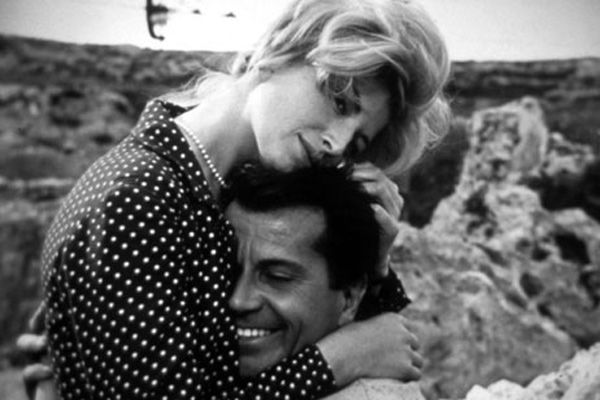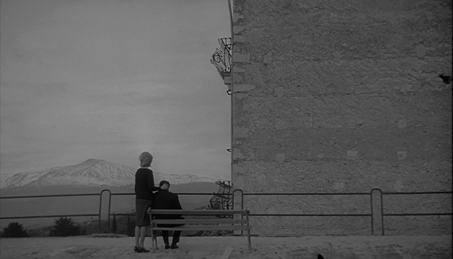From the Chicago Reader (May 14, 2003). — J.R.

The controversial, highly charged 1960 masterpiece that put Michelangelo Antonioni’s name on the international map. It’s a work that requires some patience — a 145-minute mystery that strategically elides any conventional denouement — but more than amply repays the effort. The ambiguous title adventure begins on a luxury pleasure cruise. The disconsolate girlfriend (Lea Massari) of a successful architect (Gabriele Ferzetti) mysteriously disappears on a remote volcanic island, and the architect and the woman’s best friend (Monica Vitti) set out across Italy looking for her, becoming involved with each other along the way. In the course of their epic travels, Antonioni paints a complex portrait of a crisis in contemporary values and relationships. His stunning compositions and choreographic mise en scene, punctuated by eerie silences and shots that linger expectantly over landscapes, made him a key Italian modernist director of the 50s and 60s, perhaps rivaled only by Rossellini. This haunting work — the first in a loose trilogy completed by La Notte and L’eclisse — shows him at the summit of his powers. In Italian with subtitles. (JR)
 Read more
Read more
According to my rough calculations, based partially on scrapbook entries, I’ve published over 9,000 items since the late 60s. And according to my former technical adviser and helper Benjamin Coy back in May 2008, when jonathanrosenbaum.com was launched, over 5,500 of these appeared in the Chicago Reader. As of March 22, 2023, 8,776 items have been posted on this site, now located at jonathanrosenbaum.net.
In some cases, if one looks up a particular film title, one may even find shorter and longer versions of the same capsule — a reflection of the Reader’s practice in recent years of trimming some of its longer capsules to conserve space. (J.R. Jones informed me that this trimming is no longer done; after I left in paper in early 2008 and Mara Shalhoup came in as editor, longer versions of the capsules appear on the Reader‘s website and shorter versions appear in print.)
In a few cases, due to some computer glitch, capsule reviews have been transported from the Reader web site in incomplete form. In those cases, I would advise going to the Reader’s own web site for the full version of the capsule, and would appreciate it if readers who encounter this problem could email me about it (at jonathanrosenbaum at earthlink dot net) so that I can restore the full version of the review on this site. Read more
Written for Moving Image Source [movingimagesource.us], and posted there on October 9, 2008. — J.R.

“A writer’s reputation,” Lionel Trilling once wrote, “often reaches a point in its career where what he actually said is falsified even when he is correctly quoted. Such falsification — we might more charitably call it mythopoeia — is very likely the result of some single aspect of a man’s work serving as a convenient symbol of what other people want to think. Thus it is a commonplace of misconception that Rousseau wanted us to act like virtuous savages or that Milton held naive, retrograde views of human nature.”
Although Orson Welles is rightly regarded as someone whose creative work partially consisted of his own persona, he remains unusually susceptible to mythmaking of this sort. This is because he often figures as someone who both licenses and then becomes the scapegoat for vanity that isn’t entirely — or even necessarily — his own. Quite simply, many of those (especially males) who obsess on the “meaning” of “Orson” are actually looking for ways to negotiate their own narcissism and fantasies of omnipotence.
It’s part of the special insight of Richard Linklater’s Me and Orson Welles, which premiered last month at the Toronto International Film Festival, to perceive and run with this aspect of the Welles myth, which is already implied in its title. Read more
From the Chicago Reader (November 4, 2005). — J.R.

Jarhead
* (Has redeeming facet)
Directed by Sam Mendes
Written by William Broyles Jr.
With Jake Gyllenhaal, Peter Sarsgaard, Jamie Foxx, Lucas Black, Chris Cooper, and Skyler Stone

When Apocalypse Now opened in 1979 people argued over its politics. I always thought it was mainly prowar, so I got some satisfaction from seeing an early scene in Jarhead that shows marines at their Mojave Desert base in 1990 watching the movie on video. Itching for the gulf war to start, they whoop it up during the famous “Ride of the Valkyries” sequence, in which the cartoonish Lieutenant Colonel Kilgore ecstatically launches an air attack on a Vietnamese village to the strains of Wagner. Director Francis Ford Coppola, a known liberal, plainly saw the scene as disturbing, but screenwriter John Milius, a known hawk, has often suggested that he saw it as a hoot.
Like most of the good things in Jarhead — a somewhat muddled adaptation by writer William Broyles Jr. (Cast Away) and director Sam Mendes (American Beauty) of Anthony Swofford’s best-selling 2003 memoir — the reference to Apocalypse Now comes from the book, which alludes to movies in its first paragraph. Read more





